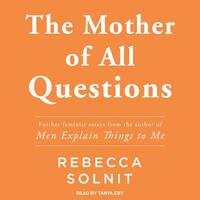Take a photo of a barcode or cover
Recommended
Rebecca Solnit does it once again! This collection of essays is sharp and insightful. The exploration of silence (in contrast to quiet) is so necessary. Her combination of rigorous research, interpretation, and storytelling come together to create a powerful effect. I'm really glad I read this book, and I want other people to read it, too.
Rebecca Solnit does it once again! This collection of essays is sharp and insightful. The exploration of silence (in contrast to quiet) is so necessary. Her combination of rigorous research, interpretation, and storytelling come together to create a powerful effect. I'm really glad I read this book, and I want other people to read it, too.
challenging
dark
emotional
funny
hopeful
informative
inspiring
reflective
sad
tense
fast-paced
The last three essays (“Men Explain Lolita to Me”; “The Case of the Missing Perpetrator”; and “Giant”) in particular spoke to me. An illuminating read as always.
Insightful, honest, brilliant, and at times painful, collection of essays by Rebecca Solnit. I only hesitated in giving this five stars because one or two of the essays didn't quite live up the rest of the collection.
Solnit writes about the pandemic of violence against women with clarity and fortitude. Her style is straightforward and yet still manages to be elegant, as she deals with topics that can be difficult to think about, yet alone write about.
The title essay and section 1 are particularly well-written and compelling. Section 2 felt a little bit weaker, but was still worth the read. The more of her I read, the more I admire Rebecca Solnit.
Solnit writes about the pandemic of violence against women with clarity and fortitude. Her style is straightforward and yet still manages to be elegant, as she deals with topics that can be difficult to think about, yet alone write about.
The title essay and section 1 are particularly well-written and compelling. Section 2 felt a little bit weaker, but was still worth the read. The more of her I read, the more I admire Rebecca Solnit.
Inte nödvändigtvis en dålig bok men kände inte att jag lärde mig särskilt mycket ”nytt” direkt, men fortfarande en bra bok som tar upp viktiga saker! Även positivt överraskade att det fanns lite intersektionella element
Solnit has a remarkable style to her writing, one that is incredibly concise, yet blazingly descriptive. Akin to bell hooks, Solnit has that innate ability to make non-fiction lyrical and immensely engaging.
There are bone-chillingly scathing sentences that are so accurate it hurts, like in the essay 'The Five-Million-Year-Old Suburb', whilst discussing the inherently patriarchal 'Man The Hunter' trope, "In every version [of the story], women are baggage that breeds." (pg.129). This tone is consistent throughout another essay, 'The Short Happy Recent History of the Rape Joke'. Similarly, while discussing the idea that men often believe their opinion to be fact and women's' to be delusions - keep in mind this is in reference to "women's issues" like rape, sexual violence and so forth, Solnit writes, “It isn’t a fact universally acknowledged that a person who mistakes his opinions for facts may also mistake himself for God.” pg.157. This is one of the aptest and witheringly scornful descriptions of every woman's experience... I sat back in awe of how Solnit was able to capture that denigrating feeling. Plus, while explicating an experience of mansplaining, she notes, “ I just goggle in amazement at the batshit that comes out of them it’s like I’m running a laboratory and they keep offering up magnificent specimens.” pg. 164. Again. Couldn't get any more accurate, could she?
What was particularly interesting to me was her interest in how language shapes society's view of women (or POC or LGBTQI+ people, though these weren't stressed, only briefly mentioned):
“Any individual woman is liable to be treated as a walking referendum on women - are we all emotional, scheming, math-adverse? - while men are relatively free of being thus measured. We don’t hear a lot of generalisations about whiteness, and Roof or Charles Manson is not considered a disgrace to his race or gender. Being treated as beyond or outside category may be a kind go privilege, a status as an individual rather than a specimen. It’s to be allowed to define yourself and given room to do so.” (pg.140)
This is a small volume - less than 200 pages - which is teeming with information about "women's issues" (which, of course, Solnit notes that they are, really, everyone's issues, but pertain specifically to women as they occur with higher frequency to that gender). My only gripe is that there is little focus on POC/WOC or LGBTQI+ issues, which may be as a result of Solnit being neither. She does note that there is privilege in being white, especially in the context of white males, and does concede there are massive differences in being a white woman in comparison to being a Latina woman, for example. Regardless, there is little depth to that concession, and is never explicated any further. These concessions are made irregularly, I think. If you'd like something truly intersectional, try bell hooks.
If you're looking to make a man woke, this would be it - aside from some bell hooks, but I would argue Solnit's writing is less dense and far more conversational, without losing any academic merit. Solnit knows that the first criticism of women's writing - especially non-fiction - is that it is 'unreasonable' or 'over-emotional', and it isn't. It's personal, yes, but it's justified (not that women's experiences have to be, but still), and is well-paced, well-organised and, really, just well-written. I would note this is definitely a more intro to women's issues, rather than a definitive non-fiction explanation.
There are bone-chillingly scathing sentences that are so accurate it hurts, like in the essay 'The Five-Million-Year-Old Suburb', whilst discussing the inherently patriarchal 'Man The Hunter' trope, "In every version [of the story], women are baggage that breeds." (pg.129). This tone is consistent throughout another essay, 'The Short Happy Recent History of the Rape Joke'. Similarly, while discussing the idea that men often believe their opinion to be fact and women's' to be delusions - keep in mind this is in reference to "women's issues" like rape, sexual violence and so forth, Solnit writes, “It isn’t a fact universally acknowledged that a person who mistakes his opinions for facts may also mistake himself for God.” pg.157. This is one of the aptest and witheringly scornful descriptions of every woman's experience... I sat back in awe of how Solnit was able to capture that denigrating feeling. Plus, while explicating an experience of mansplaining, she notes, “ I just goggle in amazement at the batshit that comes out of them it’s like I’m running a laboratory and they keep offering up magnificent specimens.” pg. 164. Again. Couldn't get any more accurate, could she?
What was particularly interesting to me was her interest in how language shapes society's view of women (or POC or LGBTQI+ people, though these weren't stressed, only briefly mentioned):
“Any individual woman is liable to be treated as a walking referendum on women - are we all emotional, scheming, math-adverse? - while men are relatively free of being thus measured. We don’t hear a lot of generalisations about whiteness, and Roof or Charles Manson is not considered a disgrace to his race or gender. Being treated as beyond or outside category may be a kind go privilege, a status as an individual rather than a specimen. It’s to be allowed to define yourself and given room to do so.” (pg.140)
This is a small volume - less than 200 pages - which is teeming with information about "women's issues" (which, of course, Solnit notes that they are, really, everyone's issues, but pertain specifically to women as they occur with higher frequency to that gender). My only gripe is that there is little focus on POC/WOC or LGBTQI+ issues, which may be as a result of Solnit being neither. She does note that there is privilege in being white, especially in the context of white males, and does concede there are massive differences in being a white woman in comparison to being a Latina woman, for example. Regardless, there is little depth to that concession, and is never explicated any further. These concessions are made irregularly, I think. If you'd like something truly intersectional, try bell hooks.
If you're looking to make a man woke, this would be it - aside from some bell hooks, but I would argue Solnit's writing is less dense and far more conversational, without losing any academic merit. Solnit knows that the first criticism of women's writing - especially non-fiction - is that it is 'unreasonable' or 'over-emotional', and it isn't. It's personal, yes, but it's justified (not that women's experiences have to be, but still), and is well-paced, well-organised and, really, just well-written. I would note this is definitely a more intro to women's issues, rather than a definitive non-fiction explanation.
informative
inspiring
reflective
medium-paced
I am not one for hyperbole, and I have a tendency to soft pedal my accolades, but her essay on "Silence" could potentially be life changing for me.
challenging
inspiring
reflective
medium-paced
challenging
informative
inspiring
medium-paced
“We need to stop telling the story about the woman who stayed home, passive and dependent, waiting for her man. She wasn’t sitting around waiting. She was busy. She still is.”
Your ole bookreadin’ Meemaw is a full time caregiver. I used to think I had respect for stay-at-home parents, then my job became doing all the things two fully functional parents didn’t have time for and my respect skyrocketed. In the pandemic, most of the people who left the workforce were women and many of them cited caring for children unable to attend school as a reason. Our country has left parents, especially moms, in a horrible situation by keeping wages down and offering paltry assistance with childcare. On top of that, many choose to belittle the parents who stay home as dependents themselves, discounting all the unpaid labor that makes the working parent’s life possible. I picked this book up because I wanted to read a book about being Childfree written by a Childfree woman, but it was so much more than that. The choice to remain Childfree is wrapped up with the choice to be a parent and neither will be respected without the work Intersectional Feminism is doing. I love Rebecca Solnit’s work and it always gives me a lot to think about (and scrawl in the margins.) I’d love to see an updated version that includes the pandemic!
🥔🥔🥔🥔🥔/🥔🥔🥔🥔🥔
Your ole bookreadin’ Meemaw is a full time caregiver. I used to think I had respect for stay-at-home parents, then my job became doing all the things two fully functional parents didn’t have time for and my respect skyrocketed. In the pandemic, most of the people who left the workforce were women and many of them cited caring for children unable to attend school as a reason. Our country has left parents, especially moms, in a horrible situation by keeping wages down and offering paltry assistance with childcare. On top of that, many choose to belittle the parents who stay home as dependents themselves, discounting all the unpaid labor that makes the working parent’s life possible. I picked this book up because I wanted to read a book about being Childfree written by a Childfree woman, but it was so much more than that. The choice to remain Childfree is wrapped up with the choice to be a parent and neither will be respected without the work Intersectional Feminism is doing. I love Rebecca Solnit’s work and it always gives me a lot to think about (and scrawl in the margins.) I’d love to see an updated version that includes the pandemic!
🥔🥔🥔🥔🥔/🥔🥔🥔🥔🥔




